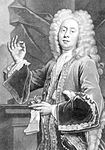Susanna Verbruggen, aka Susanna Mountfort, was an English actress working in London.
John Baptista Verbruggen, d. 1708, was an English actor working in London. Verbruggen is first mentioned as a member of the United Company in a Lord Chamberlain's warrant in 1688. His name does not appear in any cast lists until October 1690. The Biographical Dictionary of Actors contains an inconclusive discussion of the statement in Thomas Davies's Dramatic Miscellanies (1784) that Verbruggen was identical to the actor referred to in 1680s and 90s cast lists as "Mr. Alexander", supposedly an alias based on the part of Alexander the Great in John Dryden's Rival Queens. The evidence is confusing, and there is no independent support for Davies's anecdote, written down a century later. Verbruggen had never played the part of Alexander the Great and was not to do so until January 1703.
William Bullock was an English actor, "of great glee and much comic vivacity." He played at all the London theatres of his time, and in the summer at a booth at Bartholomew Fair.

The Squire of Alsatia is a 1688 comedy play by the English writer Thomas Shadwell. Alsatia was a nickname for the Whitefriars area of London, deriving from Alsace in northeastern France. A restoration comedy, it was performed at the Drury Lane Theatre by the United Company following on from John Crowne's Darius, King of Persia. One of the best-remembered roles, that of the shrewish Mrs. Termagant was first performed by Elizabeth Boutell. It was revived numerous times during the eighteenth century.
Anne Shadwell was an English stage actor of the seventeenth century. She was one of the first English actresses to appear on stage following the Restoration She was one of six actors recruited in 1660 by William Davenant for the new Duke's Company, acting under her maiden name Anne Gibbs. Sometime between 1663 and 1667 she married the playwright Thomas Shadwell with whom she had four children. While some sources have her acting late into the century, it may be she effectively retired with the formation of the United Company in 1682. Her appearances had decreased since 1672. Following her husband's death in 1692 she was left the bulk of his estate. She had an investment in the Drury Lane Theatre in 1709, when she joined a petition to Queen Anne by the manager Christopher Rich, but nothing is known about her after this point.

William Pinkethman(also Penkethman, Pinkeman, Pinkerman, etc.; nicknamed Pinkey) (c.1660–1725) was an English comic actor, a low comedian with a droll style, and theatre manager. He was considered an imitator of Anthony Leigh.
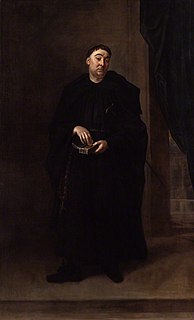
Anthony Leigh was a celebrated English comic actor.
The Younger Brother, or, The Amorous Jilt is a comedy written by Aphra Behn. The play was first performed and published posthumously in 1696, but was probably written in the late 1680s.
Sir Harry Wildair is a 1701 comic play by the Irish writer George Farquhar. It is a sequel to the 1699 hit The Constant Couple, portraying the further adventures of the most popular character from the earlier play.
The Biter is a 1704 play by the English writer Nicholas Rowe. Rowe was better known for his tragedies but chose to try his hand at comedy. Performed at the Lincoln's Inn Fields Theatre, it was not a great success and lasted for about six performances. It was overshadowed by the more popular The Careless Husband by Colley Cibber, which appeared at the Drury Lane Theatre. It was Rowe's only play in a contemporary setting, and he rapidly turned back to historical tragedies beginning with Ulysses (1705). Some sources reported Rowe defiantly and loudly laughing at the jokes during a performance, even while nobody else did.
John Bowman (1651–1739) was a British stage actor. He began his career in the Duke's Company at the Dorset Garden Theatre. In 1692 he married Elizabeth Watson, who acted under the name Elizabeth Bowman. He later switched to act at the Drury Lane Theatre. He is also referred to as John Boman.
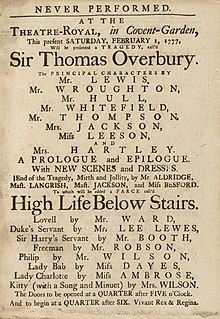
High Life Below Stairs is a 1759 comedy play by the British writer James Townley. An afterpiece, it premiered at Drury Lane on a double bill with a revival of Dryden's The Mourning Bride. A popular hit, it was frequently revived.
The School for Rakes is a 1769 comedy play by the British writer Elizabeth Griffith. It was inspired by the 1767 French play Eugénie by Pierre Beaumarchais.
The Bath; or, The Western Lass is a 1701 comedy play by the English writer Thomas d'Urfey.
The Treacherous Brothers is a 1690 tragedy by the English writer George Powell.
The Richmond Heiress is a 1693 comedy play by the English writer Thomas D'Urfey.
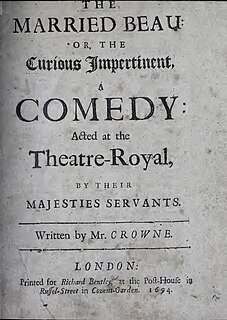
The Married Beau or The Curious Impertinent is a 1694 comedy play by the English writer John Crowne. It is inspired by a passage from Miguel de Cervantes's Don Quixote. Incidental music was composed by Henry Purcell.
The Maid's Last Prayer: Or, Any Rather Than Fail is a 1693 comedy play by the Irish writer Thomas Southerne. It was first staged at the Theatre Royal, Drury Lane by the United Company.
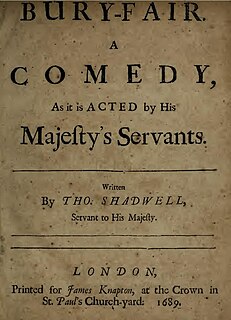
Bury Fair is a 1689 comedy play by the English writer Thomas Shadwell. It is part of the tradition of Restoration Comedy that flourished during the era. It was first staged by the United Company at the Theatre Royal, Drury Lane in London.
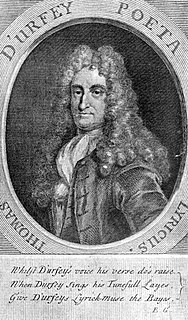
The Campaigners; Or, The Pleasant Adventures At Brussels is a 1698 comedy play by the English writer Thomas D'Urfey. It was first staged at the Theatre Royal, Drury Lane by Christopher Rich's Company.








